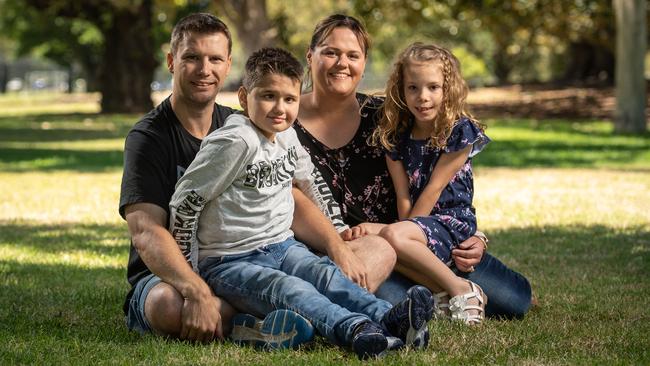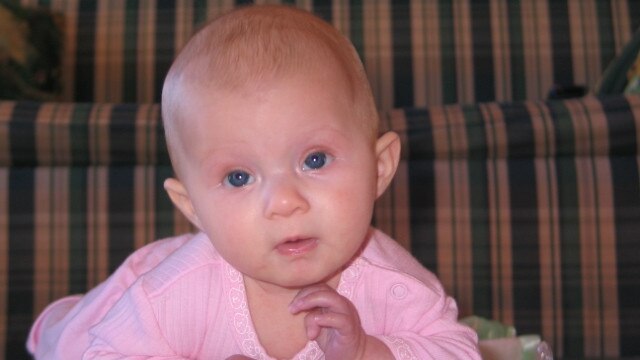Aidan Burn’s brave fight against the disease with no name
Aidan Burns is one of only four children diagnosed with a mysterious genetic disease with no name which took the life of his sister, Paige — and Adelaide researchers have now identified the cause.

SA News
Don't miss out on the headlines from SA News. Followed categories will be added to My News.
- University of Adelaide research breakthrough in brain biopsy
- RAH develops new technology to hunt then destroy cancer cells
Aidan Burns has a condition so rare it doesn’t have a name.
His older sister Paige, who also had it, died aged 2½ before it was identified, and since then only two other children, in the UK and US, have been diagnosed with it.
In a journey of heartbreak and hope Adelaide researchers now have isolated a one-in-four-million gene variant, paving the way for a diagnosis – and a treatment – of the mysterious condition which baffled science.
For parents Kristy and Leal Burns of Willaston it has been a bittersweet emotional roller-coaster where their determination to embrace the positive and enjoy each day was tempered by not looking too far ahead.
“It is hard to believe Aidan will be a teenager in January – we still take each day as it comes but he is now at school and there have been some improvements,” Mrs Burns said.
Paige reached the usual developmental milestones including standing until about 12 months but then regressed to crawling, with no language and multiple medical problems.
Doctors checked for things including a brain tumour and scoured global literature to no avail and the neurodevelopmental condition worsened.
Mrs Burns was 15 weeks pregnant with Aidan when told it was an unknown genetic condition.
Five weeks later Paige died.

Aidan also reached the usual developmental milestones including walking a few steps but then also began regressing.
However, world class Adelaide research was now involved in the family’s hope for help, with a breakthrough in 2014.
Working in a highly successful collaboration between the Centre for Cancer Biology – a University of South Australia and SA Pathology alliance – the University of Adelaide and the Women’s and Children’s Hospital, UniSA PhD student Alicia Byrne helped identify a rare genetic disease that causes severe neurodegeneration in infants.
Aidan’s entire DNA sequence was examined in an effort to find the single variant among four-million causing the disease
“When we started working with this local family, the disorder the children presented with it had never been described,” Ms Byrne said.
“We discovered that the children carried genetic changes which meant they were unable to absorb vital B-group vitamins which are essential for normal development and function of the nervous system.”

With the cause now identified, the family’s paediatric neurologist at the Women’s and Children’s Hospital, Dr Nicholas Smith, and colleagues were able to devise a targeted therapy to overcome the problem.
Dr Smith said the treatment has made a huge difference.
“For Aidan, weekly injections of the B-group vitamins in which he is deficient have been able to halt and even reverse some of the impacts of this devastating disease,” he said.
‘In rare neurodegenerative disease contemporary therapies are rapidly expanding, tailored to individuals.
“A decade ago a lot of children with similar conditions would be simply undefined conditions but that group is dropping significantly with improved diagnoses to target rare and ultra rare diseases.
“Ten years ago I’d have to say there is nothing I can offer you, today we are able to offer increasingly personalised therapies.
“There is benefit to Aidan who has regained some skills, is social, engaged, understands things and has an improved quality of life.
“But it is bittersweet – it would have been good if we had been able to treat him much earlier.
“By confirming the genetic diagnosis the family were able to have another child without concern.”

That baby was Makenna, now 7, who adores her older brother.
Mrs Burns said Aidan had gone from crawling to being able to climb and walk in his walker, enjoys school at Adelaide West Special School and can say “Mum” and “Bub” while also using a computer language pad.
“We do take each day as it comes and look for the positive, and Aidan is doing much better than we ever hoped after losing Paige,” she said.
Ms Byrne’s PhD supervisor, UniSA Adjunct Professor at the Centre for Cancer Biology, Hamish Scott said rare diseases are a broad and significant area of genomics research.
“While a rare genetic disease may only impact a handful of people, what we are quickly understanding in our work on the human genome is that there are myriad different rare diseases,” he said.
“Genomic research opens an important path in identifying and, with strong partnerships such as we have here in South Australia between universities, government and our hospitals, in developing personalised precision medicine to treat rare diseases.
“In addition, the work we do in understanding genes and how they make the body work, constantly informs human biology and provides deeper understandings of human health that have population-wide relevance.
“Our goal is to develop genomic testing so that children can be diagnosed at or before birth and treatments can be delivered as early as possible.”

